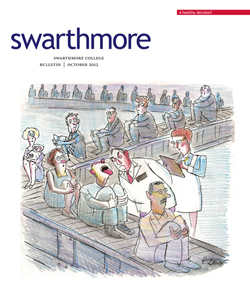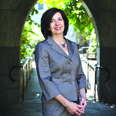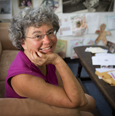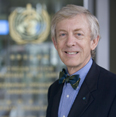Features
A Healthy Decision?
By Sherri Kimmel
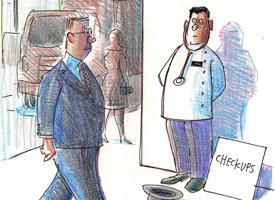 A month after graduation you wouldn’t expect the second floor of Kohlberg Hall to be buzzing with activity. But on June 28, several economics professors were hunkered down in their offices, poised in anticipation.
It was nearing 10 a.m., the witching hour for the Supreme Court’s decision on whether or not the Affordable Care Act (ACA), popularly and somewhat derisively known as Obamacare, would live or die.
The media machine was in a race to be first out of the gate with the hot news.
Assistant Professor Erin Todd Bronchetti pulled up CNN and saw that the Roberts Court had struck down the health-care reform law. Her eyes were not sparkling with delight.
A month after graduation you wouldn’t expect the second floor of Kohlberg Hall to be buzzing with activity. But on June 28, several economics professors were hunkered down in their offices, poised in anticipation.
It was nearing 10 a.m., the witching hour for the Supreme Court’s decision on whether or not the Affordable Care Act (ACA), popularly and somewhat derisively known as Obamacare, would live or die.
The media machine was in a race to be first out of the gate with the hot news.
Assistant Professor Erin Todd Bronchetti pulled up CNN and saw that the Roberts Court had struck down the health-care reform law. Her eyes were not sparkling with delight. Features
Civic Connections Power Professor’s Work
By Carol Brévart-Demm
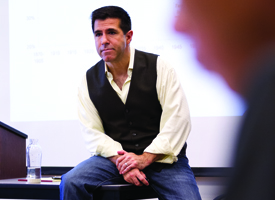 This year, as he did four years ago, Associate Professor of Political Science Ben Berger is teaching his students about the electoral process not only in class but also on the streets. “We’re doing voter registration, and students also have an option to work with campaigns of their choice—whether local, state, national, Republican, Democrat—or to work with community partners outside of the political system,” he says. Driving students to surrounding communities so they can walk door to door encouraging residents to vote is another activity he anticipates during every election year as part of his community-based learning class, Democratic Theory and Practice.
This year, as he did four years ago, Associate Professor of Political Science Ben Berger is teaching his students about the electoral process not only in class but also on the streets. “We’re doing voter registration, and students also have an option to work with campaigns of their choice—whether local, state, national, Republican, Democrat—or to work with community partners outside of the political system,” he says. Driving students to surrounding communities so they can walk door to door encouraging residents to vote is another activity he anticipates during every election year as part of his community-based learning class, Democratic Theory and Practice. Features
Open to Debate
By Paul Wachter ’97
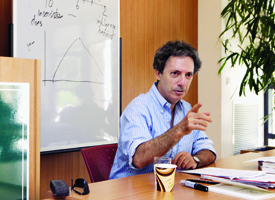 Peter Berkowitz ’81, a senior fellow at Stanford University’s Hoover Institution,
has accumulated advanced degrees with the frequency of a fashionista who must have the season’s new line. A master’s degree in philosophy from the Hebrew University of Jerusalem. A law degree from Yale. A Ph.D. in political science from Yale. It’s an intellectual’s resumé, and it’s easy to imagine Berkowitz as a young child in Deerfield, Ill., curled over a challenging book. But as he tells it, it was his devotion to another object?the tennis racquet?which may have launched his career as a scholar.
Peter Berkowitz ’81, a senior fellow at Stanford University’s Hoover Institution,
has accumulated advanced degrees with the frequency of a fashionista who must have the season’s new line. A master’s degree in philosophy from the Hebrew University of Jerusalem. A law degree from Yale. A Ph.D. in political science from Yale. It’s an intellectual’s resumé, and it’s easy to imagine Berkowitz as a young child in Deerfield, Ill., curled over a challenging book. But as he tells it, it was his devotion to another object?the tennis racquet?which may have launched his career as a scholar. Features
The Right Kind of Economist
By Christopher Maier
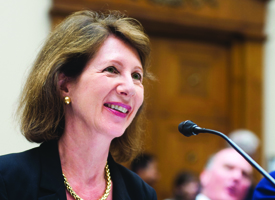 Diana Furchtgott-Roth ’79 is the kind of person who savors opportunities to explain how economic theory affects the way we live our lives. “I prefer to translate economics into public policy” is how she puts it, her words coated in a polished English accent. And whether she’s talking about health care, green jobs, gender in the workplace, or any other of the near-infinite number of topics that pique her interest, she typically performs this translation while espousing a steadfast belief in the twin values of liberated markets and limited government—a stance the 53-year-old has honed throughout a long career in the nation’s capital.
Diana Furchtgott-Roth ’79 is the kind of person who savors opportunities to explain how economic theory affects the way we live our lives. “I prefer to translate economics into public policy” is how she puts it, her words coated in a polished English accent. And whether she’s talking about health care, green jobs, gender in the workplace, or any other of the near-infinite number of topics that pique her interest, she typically performs this translation while espousing a steadfast belief in the twin values of liberated markets and limited government—a stance the 53-year-old has honed throughout a long career in the nation’s capital. Collection
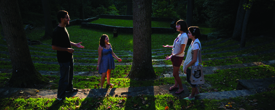
- College starts 144th year of instruction with strong class of first years
- 6 Colleges, 1 Lang Scholar, 7 college-bound Graduates
- A 150th Birthday for the Board of Managers
More collection articles from this issue
Community Voices
Cultivating a Diverse and Inclusive Learning Environment
By Liz Braun
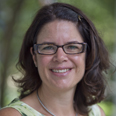 During the last two years, in the context of strategic planning, students, faculty, and staff have been in dialogue about Swarthmore’s strengths and challenges in fulfilling our commitment to cultivating a diverse and inclusive learning environment.
The College has long been a leader in recruitment and retention of underrepresented students. Numbers are a critical component; however, they are only one facet of a diverse and inclusive learning community.
During the last two years, in the context of strategic planning, students, faculty, and staff have been in dialogue about Swarthmore’s strengths and challenges in fulfilling our commitment to cultivating a diverse and inclusive learning environment.
The College has long been a leader in recruitment and retention of underrepresented students. Numbers are a critical component; however, they are only one facet of a diverse and inclusive learning community.
Connections
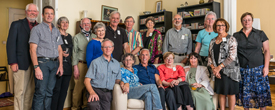
- Alumni Pack Their Bags for Prague
- Bay-Area Business Group Hosts Robotics Event
- New York Networking Event Draws Student Interns
More connections articles from this issue
Books + Arts
Reducing Gun Violence is Author Kennedy’s Aim
 David Kennedy ’80 describes his extra-ordinary book as a work of “experimental nonfiction.” Some people refer to it as a memoir. I call it an “autobiography of public policy.” Kennedy, a well-known and highly respected academic criminologist, tells the story of both his scholarship and his practical efforts to end gun violence in American cities. It is an unusually forthright book, intensely personal, and compelling in its message and conviction.
David Kennedy ’80 describes his extra-ordinary book as a work of “experimental nonfiction.” Some people refer to it as a memoir. I call it an “autobiography of public policy.” Kennedy, a well-known and highly respected academic criminologist, tells the story of both his scholarship and his practical efforts to end gun violence in American cities. It is an unusually forthright book, intensely personal, and compelling in its message and conviction.
In My Life
Swarthmore in Brooklyn
By Abby Kluchin ’03
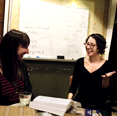 In the fall of my senior year, Professor Mark Wallace announced to our Postmodern Religion Thought honors seminar that we could understand the 20th century as a choice between Roland Barthes and Karl Barth. Naturally, this inspired Christine Smallwood ’03, one of my first-year roommates, and me to go straight home to make matching hand-lettered T-shirts with the authors’ names emblazoned on the front. We proudly wore them to seminar the following week. I picked Karl; Christine chose Roland.
In the fall of my senior year, Professor Mark Wallace announced to our Postmodern Religion Thought honors seminar that we could understand the 20th century as a choice between Roland Barthes and Karl Barth. Naturally, this inspired Christine Smallwood ’03, one of my first-year roommates, and me to go straight home to make matching hand-lettered T-shirts with the authors’ names emblazoned on the front. We proudly wore them to seminar the following week. I picked Karl; Christine chose Roland.
